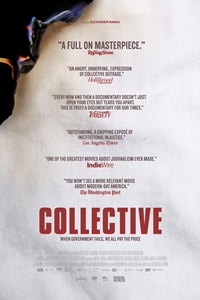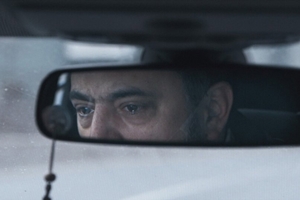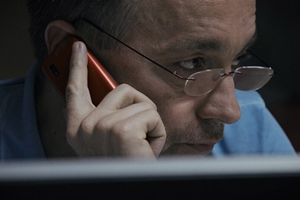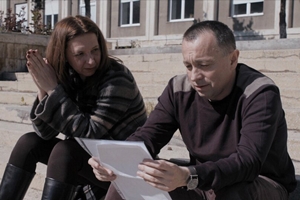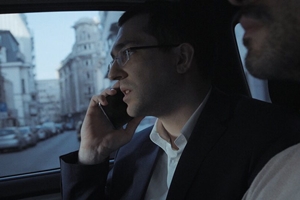Canada: Friday, November 20, 2020
Magnolia Pictures
http://www.magpictures.com/collective/
Directed by Alexander Nanau (TOTO AND HIS SISTERS), COLLECTIVE follows a heroic team of journalists as they uncover shocking, widespread corruption. After a deadly nightclub fire, the mysterious death of the owner of a powerful pharmaceutical firm, and the quiet resignation of a health minister - seemingly unrelated events, all within weeks of each other - the team of intrepid reporters exposes a much larger, much more explosive political scandal. COLLECTIVE is a fast-paced, real-time detective story about truth, accountability, and the value of an independent press in partisan times.
Cast & Crew
Movie Cast
Movie Crew
User Reviews
Public Reviews - 1 Reviews
-
Gregory M. - Rated it 4 out of 5
"Collective" "Collective" is a gripping, real-time docu-thriller that follows a heroic team of journalists as they expose shocking corruption in 'The Romanian' national health-care system. After an explosive fire claims the lives of 27 people at Bucharest nightclub, 'Colectiv', officials reassure the public that surviving victims will receive care in facilities that are better than in Germany. Weeks later, a rising causality count leads intrepid reporters at 'The Sports Gazette' to investigate. Just as a crucial tip exposes 'Hexi Pharma', a local firm’s culpability, the firm’s owner dies under mysterious circumstances and the health minister quietly resigns amid the uproar, but this is only the first chapter in a thrilling, ever-twisting exposé. Closely tracking the efforts of 'The Gazette' team as they methodically discover layer upon layer of fraud and criminal malfeasance, the film is a fast-paced, real-time detective story about truth, accountability, and the value of an independent press in partisan times. Catalina Tolontan (47) is a sports journalist and editor-in-chief of the daily newspaper 'Gazeta Sporturilor'. He's a famous sports journalist but he’s also famous for being an investigative journalist. What he did for the last fifteen or twenty years, in terms of investigations, is all in the sports world. Over the last years, he gained great notoriety by leading a series of investigations on corruption in 'Romanian' sports and politics which brought several resignations of ministers and a series of court cases that ended with the imprisonment of several politicians. After 'The Colectiv' club fire, he and his team of editors, started to investigate the role of the state institutions involved in 'The Colectiv' tragedy. Their investigation into the medical treatment in Bucharest hospitals that affected 'The Colectiv' burn patients is one of the greatest journalistic investigations in 'Romanian' history. Their thorough enquiry on the company "Hexi Pharma' shattered the entire health system. Camélia Roiu (47) becomes the first Romanian whistle-blower after 'The Colectiv' club fire. She decides to disclose to Catalin Tolontan and his investigative team at 'The Sports Gazette' a secret well-kept by 'Romanian' authorities about the cause of deaths of burn patients. Her courage inspired doctors and other people to come forward about the frauds in 'The Romanian Health System'. Teddy Ursuleanu (29) is a survivor of the fire. Her looks changed dramatically, as she suffered severe burns on her head and body, and her fingers are amputated. Nevertheless, she's positive and happy to be alive. She embraces her new self and wants to become an example for others by using art to heal her trauma. Vlad Voiculescu (33) works in Vienna as vice-president of an investment department for many years. By the age of 27, he had founded the cytostatic network, a group of dozens of people smuggling cancer medicine from Austria, Germany and Hungary into Romania for diagnosed patients who had no access to medication. As a former activist for patient's’ rights, he becomes the new 'Minister Of Health' once his predecessor was forced to resign. Narcis Hogea (49) is the father of Alex Hogea (19). His son suffers severe burns in the fire in 'Colectiv' and is taken to 'The Bucharest University Hospital'. When Narcis wants to transfer his son to 'The General Hospital' in Vienna, the management of 'The University Hospital' in Bucharest refuses to approve the transfer. Alex is finally transferred one week after the fire to Vienna where he dies on November 22nd from infections with multi-resistant bacteria. We've characters who have the guts to stand up for their own beliefs and personality. Starting from the tragic incident that led to a government fall in 2015, the film takes a look at the year that followed and the way authorities, journalists, and regular citizens dealt with it. The social unrest and the total rupture between the Romanian society and those that are governing it, takes place after the deadly fire at 'The Colectiv' club seemed to reflect a development that could already be feel in many countries in Europe and beyond. No interviews, no voice over. The documentary is a purely observational one. It's a process of learning from the life of others, of growing on a personal level by getting as close as possible, up to a point of complete identification, with the chosen protagonists. From the start at first we don't know too much from, nor about, the characters. The film frames in a way that will make the viewers feel as if they're living in close proximity to and discovering the characters. The viewer feels as if witnessing his or her own process of personal growth through the life of others. The film experiences the full extent of the blow suffered by a democratic 'European' society which could never have imagined that dozens of people could die when going out to a club. Like any single traumatized human, a traumatized society becomes easy to manipulate and to lie on. We've seen manipulation silencing people and stopping them from asking questions for a time. While young people injured in the fire keep dying in hospitals. The hardest challenge for a father, is to witness the pain that parents went through after losing a child. The pain of not having been able to save the life of one’s own child, while it would still have been possible, because of the power and the lies of state authorities. It's an organic decision to follow the very few that also doubted the official version of the events. The ones that are asking the unexpected, yet simple questions. The journalists plunge deeper and deeper into an entire network of lies and corruption within the healthcare system. Even when doubted by everybody, they didn’t abandon their quest. The investigations started to uncover a series of overwhelming facts about corruption in the healthcare system, which had endangered patient's lives for years. The biggest challenge of the film is to balance the real-life events, seen from different perspectives, and offer a better understanding of the powers that shape our private lives in a society. "Collective" starts out of a personal curiosity about the inner workings of the governing forces that are influencing our lives, regardless of the country we live in. This multi-layered story feels to be evocative of many countries political situations nowadays. We live in a Europe where societies have constantly grown to be disappointed and unhappy with their governments, a situation that raised a question in many people’s minds; are politicians still working in the best interest of the citizens? At that specific moment in time, 'Colectiv' and everything that follows becomes emblematic for this social awakening. Although the events portrayed in the film have been broadly publicized in national and international media, we've to understand the need to tell the story in a cinematic way, as we feel it's potential lays in the universal values that are the bases of our societies; freedom of speech, right to health, seeking the truth, and defending democracy. Audience will experience the same enlightenment after watching the film, that allows them to become aware of abuse of power by those who govern, and to value the importance of a free press working in the service of society. "Collective" is a film about a massive violation of trust; and yet it’s also a testament to the idea of trust and the role of investigative journalism in reporting the truth, in making officials accountable. The details of this story are incredibly hard to wrap your head around, the callous indifference to human suffering is extraordinary. Everybody knows there’s corruption, doctors get bribes in hospitals. But nobody thinks about the lack of humanity that this covered up, and that's the biggest shock. The lack of humanity doctors had being tied to such a corrupt system is something that's very hard to understand. We've to understand through art how we function psychologically. People understand what powers influence their life, and what do we do with these powers that influence us? Who are we? What are our attitudes and beliefs and are they strong enough to stand up to this or are we just subordinates? That’s the theme of the whistleblowers. It’s why they suddenly say 'I’m not going to play this game anymore'. Something is dead in these people, something is not human anymore. The way the attempts to reform the system given a nasty spin in the media mirrors tactics we see in 'The U.S', 'Britain', and elsewhere at the moment where populism is taking root written by Gregory Mann
